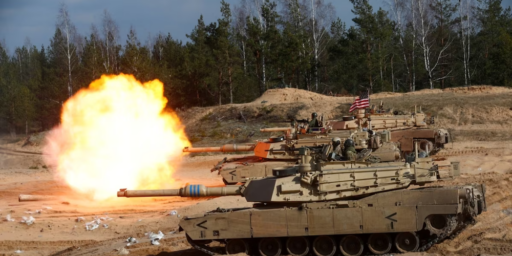Counter-Insurgency Lessons Learned
Stephen Green presents a chart from Jim Dunnigan which demonstrates, rather convincingly, that insurgencies are in fact defeatable:
Conflict / Period / Victor
Greek Civil War 1944-49 Government
Spanish Insurgency 1944-52 Government
Chinese Civil War 1945-49 Insurgents
Indochina War 1945-54 Insurgents
Iranian Communists 1945-46 Government
Philippine Huk War 1946-54 Government
Madagascar Revolt 1947-49 Government
Korean Partisan War 1948-53 Government
Malayan Emergency 1948-60 Government
Kenyan Mau-Maus 1952-55 Government
Cuban Revolution 1956-58 Insurgents
Sarawak/Sabah 1960-66 Government
I’d be interested in seeing an updated list; surely there have been other insurgencies during the last 38 years. Certainly, the Government chalked up a win in El Salvador in the early ’80s (with an assist from Uncle Sam).
Regardless, Steve makes the following observation after surveying the list:
However, if you’ll look at the dates, you’ll notice that each anti-guerilla campaign took years. The shortest insurgency (Iran’s postwar Communists) was defeated quickly, but Islamic countries never were fertile ground for Soviet-style communism. Soviet tanks, sure, but not outright communism. In other words, we face a long battle in Iraq – and that’s the danger.
If we leave Iraq unfinished – whether it takes three years or a dozen – then we will have thrown away our first, last and best chance at creating the first decent nation-state in the Arab World. We’ll have torn up the Game Plan. Do Americans have the patience to finish the job?
I think we’ll find out the answer to that on November 2nd.



As I commented at Green’s site, Algeria 1954-62 is the case to look at if we want to learn the lessons of Arab/Islamic insurgencies.
Insurgencies are indeed defeatable. Just look at the two countries in question: the USA and Iraq. Both defeated insurgencies of of their own using brutal but effective force to destroy their own countrymen desire for seperation. I am of course referring to the US Cival War and to the Kurdish uprising, and others, in Iraq.
But this war in Iraq is not exactly the same thing is it? Here we have a foriegn power, the USA, come to intall a new government. The insurgents are fighting both the US and the puppet government for the right to establish their own form of government. Whatever that may be.
Who will win? Whoever wants it the baddest will win. Whoever is willing to do whatever it takes to win, will win.
Do we really care that much or have that much at stake to do WHATEVER it takes. I doubt it. This was supposed to be an easy low cost war. It was worth about what Bush told us it was going to cost: NOTHING.
Of course insurgencies are defeatable. That’s a trivial demonstration.
But how many of these insurgencies were successfully defeated by an occupying power? That’s a much more interesting question.
One of my misgivings about the war in Iraq was that I didn’t believe that we had the patience. It’s difficult to muster the needed resolve we the country so closely divided as it is.
It always seemed to me that any notion that we’d be in Iraq less than 50 years was dewy optimism. After all we’ve been in Germany, Japan, and Korea that long.
Our presence in Germany, Japan and Korea for 50-plus years, Dave, was due to threats from outside, not because of homegrown insurgencies.
Still, a lot of people do forget that WW2 didn’t end as cleanly as the history books tell it.
Yep. No one wants to recall the several years of insurgency that went on in Germany after WWII. Why should this be different?
“But how many of these insurgencies were successfully defeated by an occupying power? That’s a much more interesting question.”
Depends how you define “occupying power”.
Madagascar, Malaya (as it was then known), and Kenya were (at the time the insurgencies began) frank colonial dependencies. Malaya gained its independence in 1957, but didn’t add Sabah and Sarawak until 1961 (is Malaya an “occupying power” there? Is the U.S. an “occupying power” in Korea?)
I think though, that the message is clear: “occupying powers” can and have ended insurgencies. “The People United Can Never Be Defeated” might be true, but it can’t be proved empiricially.